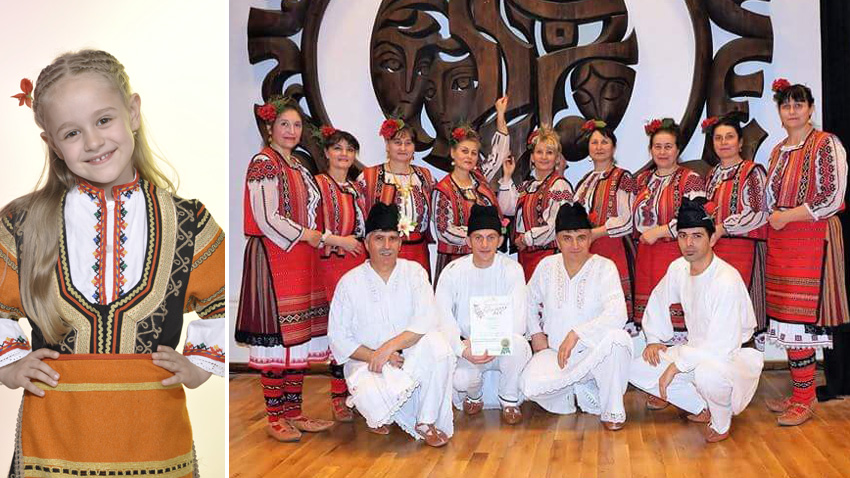This year’s 5th edition of the folk song and dance festival “Bird Singing” proved to be a heated contest, with an enthusiastic audience and a great many contestants. It is one of few folklore competitions taking place in Sofia.
This year there were twice as many contestants as last year and the Krasno Selo Municipal Cultural Institute that hosted the event was literally bursting at the seams. The festival is named after a song from the repertoire of renowned folk singer, the late Nadka Karadjova, who passed away five years ago. A scholarship fund for young performers was established in her name by her daughter, Svetla Karadjova, organizer of the contest and lecturer at the St. Kliment Ohridski University, Sofia.
The grand prix this year went to the folk song groups from Kavarna. Gold statuettes were awarded to the Zrdavets folklore group from Kapitanovtsi village, Vidin district as well as to children from all parts of the country. The grand cash prize and a gold statuette was bestowed on young singer Diana Chausheva, a student at the Lyubomir Pipkov National Music School in Sofia. But what made the competition really rewarding was that it gave young performers an opportunity to sing and dance at a prestigious event to a select audience.

“We must take care to preserve the “gold” of Bulgaria, as folklore is often called,” says Svetla Karadjova. Each of the songs presented so professionally demonstrates the amount of hard work her colleagues – pedagogues and tutors – have invested in their students.
“I would like to thank my colleagues for the huge amount of work they have done, because they are the people who mould these talents. These tutors are true professionals and they really put their hearts into sharing their knowledge and skills with the budding musicians. The choice of winner in the contest categories was really difficult because so many of the participants were so talented. Bulgarian folklore is a fascinating phenomenon that reaches out to people anywhere in the world. Love of Bulgarian folklore is a love that stays with you for life. In Australia, for example, at the music academy in Sydney you will see students singing Sevdalina, my lass. In France, Great Britain, USA there are festivals of Bulgarian folk dance clubs. The participants are local people, all of them really excited to be learning the steps of our horo dances. There is something in Bulgarian folklore that brings people together and it is our mission to popularize and preserve it.”
Svetla Karadjova says there is revived interest in folklore, especially in Sofia and other big cities. “Even in night clubs, young people listen to folk music and dance to it. Many people go to the specialized folk music dance halls,” says Svetla Karadjova and adds:
“This year’s “Bird Singing” festival brought together instruments, orchestras, dance formations and all other music formats to be found in Bulgarian folklore. Many young and ambitious talents from all parts of Bulgaria came to compete – from Smolyan, Madan, Silistra, Varna, Rousse, Vidin, Blagoevgrad, Kyustendil, Plovdiv. From Sofia we had talented students from different schools. Festivals like ours are a springboard for beginners and a great incentive. I was born to a family of musicians and I witnessed the development of my mother’s generation with prominent names like Kalinka Vulcheva, Kalinka Zgourova, Kremena Stancheva, Olga Borissova… Singers who took Bulgarian folklore to the stages of the world. As someone who can bear witness to the triumph of Bulgarian folklore, I can assure you it is phenomenal and the renowned names in traditional music can well measure up to the foremost names in opera. What I would like to see is more publicity for the successes of our folk singers, musicians, choirs so as to inspire our younger colleagues to take up and continue the work of the older generation.”
English version: Milena Daynova
On 22 November, the Association of Bulgarian Folk Ensembles Abroad (ABFEA) will present its project, 'Online Catalogue of Bulgarian Horo and Other Dances', in three European cities: Lyon, Munich and Copenhagen. 'Our goal is to preserve Bulgarian..
‘The Bulgarian horo is a kind of magic — an enchanted circle that pulses with the unique energy of our spirit, our traditions and our identity,’ says journalist Milena Milotinova, who recently presented her new documentary The Magic of the Bulgarian..
The Eastern Rhodopes come to life in the heart of Sofia – with authentic flavoуrs, music and craftsmanship . Residents of the Bulgaria capital have a chance to immerse themselves in the atmosphere of Momchilgrad Municipality and its cultural and natural..

+359 2 9336 661
